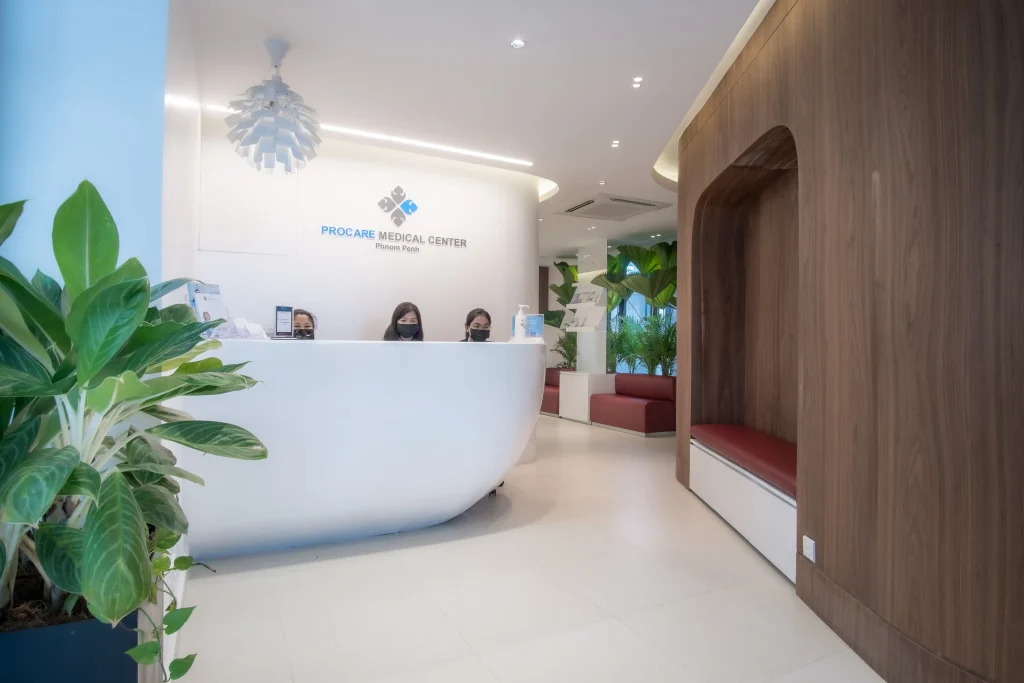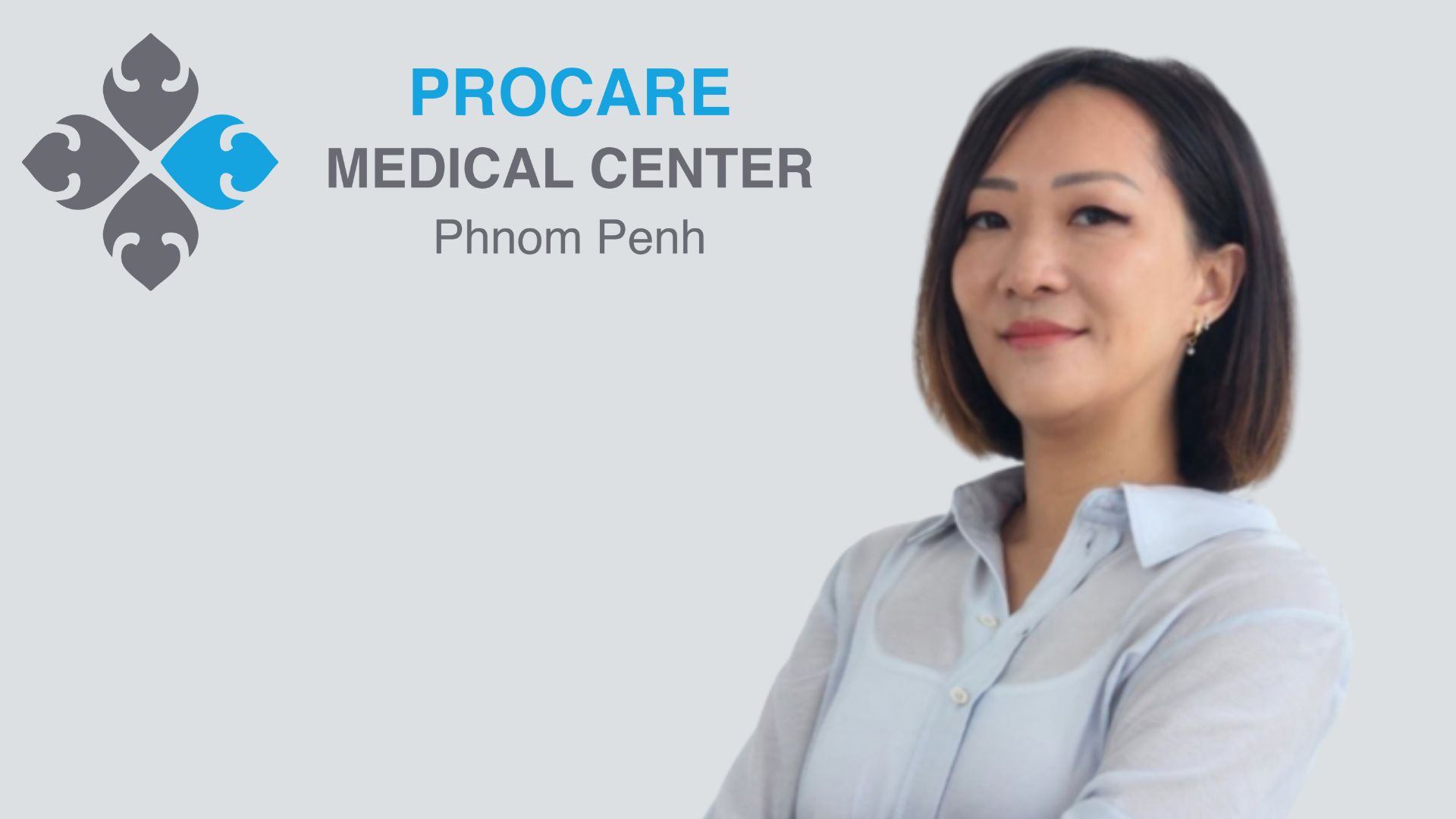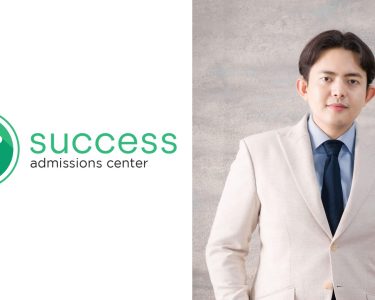Stew Post
Senior Communications Officer Stew Post sat down with Dr. Julie Thongsavane — Family Doctor specialising in Pediatrics and Aesthetic Medicine, CEO of Procare Medical Centre, and Referral Doctor for the French Embassy — to discuss her professional journey and insights into Cambodia’s growing healthcare sector.
Their discussion touched on the impetus for her move to Cambodia from France, the challenges and opportunities facing Cambodia’s healthcare landscape, and the ways that tech and digital innovation can support doctors, rather than replace them.
Read More: EuroCham Interview – Thomas Bianco on Cambodia’s Emerging Market for Premium Cigars
Stew: Could you tell us a bit about your background and what inspired you to practice medicine here in Cambodia?
Dr. Julie: I came to Cambodia because my husband wanted to reconnect with his roots, and I had always dreamed of practicing medicine abroad.
In France, I had already founded one of the first multidisciplinary medical practices in Paris, bringing together family doctors, a cardiologist, dermatologist, ophthalmologist, psychologist, and vascular specialist — which was quite innovative at the time.
When I arrived in Phnom Penh, it felt natural to create my own medical centre, both to support the French and expatriate community and to offer high-quality care to the local population.
My initial vision was ambitious: to open several practices and train Cambodian doctors according to international standards. However, after meeting more than sixty local doctors, I realised that the gap in training and clinical practice was still too wide to achieve this immediately.
This experience led me to recruit doctors from abroad, mainly from France and Europe, to build a multicultural and highly qualified team, while still mentoring local Cambodian doctors eager to improve their skills.
Today, Procare Medical Center, founded in 2016, has become a trusted reference clinic in Phnom Penh, well known among both expatriate and Khmer communities, and I have the honor of serving as the official referral doctor for the French Embassy in Cambodia.
Healthcare Needs and Realities Of Cambodia
Stew: As a family doctor trained in France, how have you adapted your approach to fit the healthcare needs and realities of Cambodia? Are there any challenges or opportunities that you feel are unique to Cambodia’s healthcare landscape?
Dr. Julie: When I first arrived, I noticed that preventive healthcare was not yet part of people’s habits.
Many patients only seek medical help when symptoms appear, often resorting to self-medication, overuse of antibiotics or IV drips, and sometimes a tendency to panic over minor symptoms.
This is partly due to a lack of structured medical education and continuity of care.
In Cambodia, there isn’t yet the same concept of a “family doctor” as in France — someone who knows your medical history, coordinates between specialists, and follows you over time.
That’s precisely the model I wanted to bring here with Procare — a small, patient-centered practice where people are not just “cases,” but patients who are known, listened to, and cared for personally.
This human and personalised approach is very well received, not only by expatriates, who find a familiar model of care, but also by Cambodian patients, who increasingly seek quality medicine based on trust, transparency, and prevention.
In this context, adaptation also means education — taking time to explain, to build confidence, and to promote regular medical follow-up.
Stew: From your experience, what role does the private sector play in improving access to healthcare in Cambodia? How can private clinics like Procare complement the public health system in ensuring quality care for everyone?
Dr. Julie: In Cambodia, the private healthcare sector plays a crucial role in providing accessible, high-quality care, particularly for the middle class and expatriate population.
Private clinics offer same-day appointments, extended hours, multilingual staff (English, French, Khmer, Chinese), and often have on-site laboratories and imaging facilities that allow for faster results and follow-up.

At Procare Medical Center, we aim to go even further by providing, personalised family medicine, where the patient is not just a number; accurate diagnosis and continuous coordination of care; referral pathways to trusted specialists and hospitals when needed; and a strong culture of continuity rather than one-time consultation.
The private sector does not replace the public system, but it can raise overall medical standards and restore trust in local healthcare.
Our mission is to combine proximity, quality, and humanity, while adhering to international medical standards.
Digital Tools, Including AI And Telemedicine
Stew: With EuroCham’s Healthcare Forum and Innovation Forum coming up, what role do you think digital tools, including AI and telemedicine, can play in improving Cambodia’s healthcare landscape?
Dr. Julie: Artificial intelligence is transforming every industry, and medicine is no exception. But I believe AI should support doctors, not replace them. Nothing will ever replace a thorough clinical examination or the human connection between a doctor and a patient.
At Procare Medical Center, we were among the first clinics in Cambodia to offer daily telemedicine consultations from 8 AM to 8 PM, including evenings, weekends, and public holidays.
In a country where infectious diseases and road accidents are frequent, it is essential for patients to have 24/7 access to a qualified doctor. Digital tools help us bridge geographical distances, improve coordination of care, and maintain continuous medical follow-up.
The future of healthcare in Cambodia will depend on a connected yet human-centered medicine, where technology enhances — rather than replaces — the art of caring.
Stew: How do you see healthcare needs in Cambodia evolving in the coming years, especially with more awareness around wellness and preventive care? What are your priorities for growing or improving your practice to meet these changing needs?
Dr. Julie: Cambodia’s healthcare landscape is changing rapidly.
With a young population, a growing middle class, and increasing exposure to international standards, there’s now a greater awareness of wellness, prevention, mental health, and nutrition. Patients today want to understand their health, not just be treated when they’re ill.
My priorities for the coming years are to, strengthen preventive care, especially for women and children; train young Cambodian doctors in international medical ethics and best practices; and develop new community-based practices, maintaining a high level of quality while keeping a human touch. Since 2016, Procare Medical Center has had one clear mission: to combine competence, compassion, and trust to build a new standard of healthcare in Phnom Penh.
Procare Medical Center offers a wide range of specialties including Family Medicine, Pediatrics, Dermatology Surgery, OBGYN, Chiropractic, Aesthetics, and a French-speaking Psychologist, along with lab services and vaccinations. Located at AURA Condominium, 87 St. 63 (Ground Floor) — book easily via Telegram: 061 828 410.





